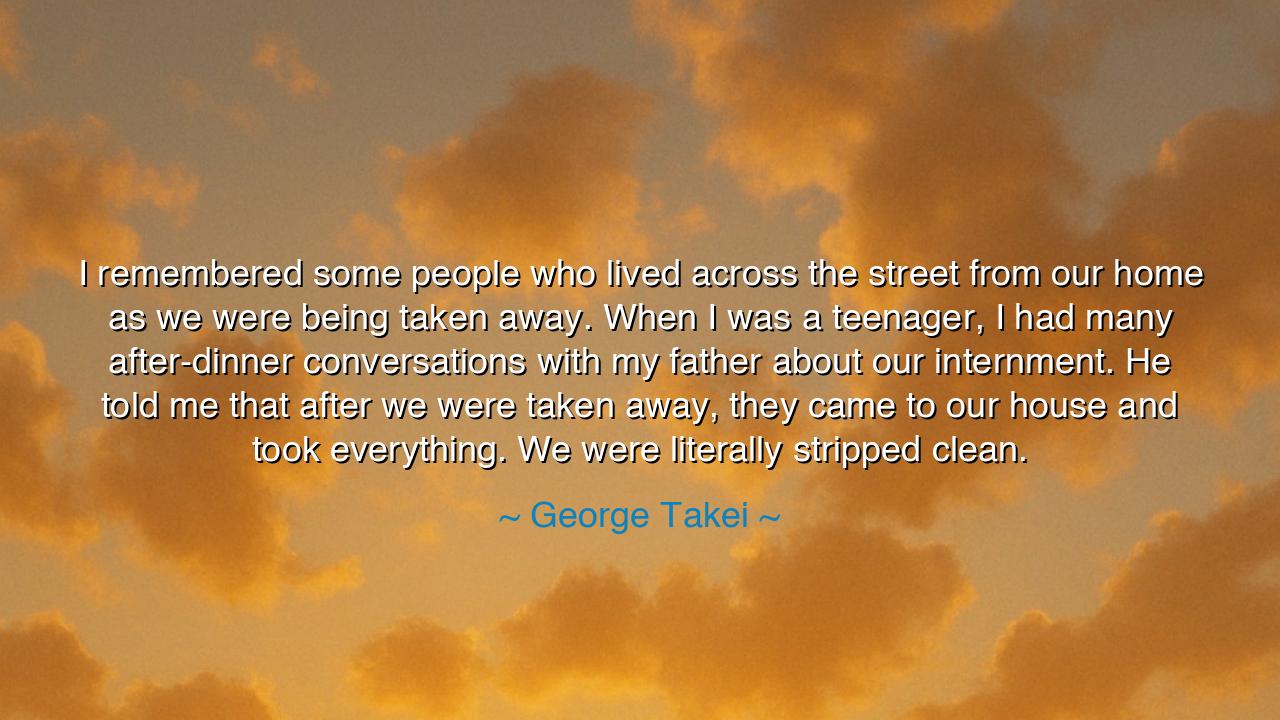
I remembered some people who lived across the street from our
I remembered some people who lived across the street from our home as we were being taken away. When I was a teenager, I had many after-dinner conversations with my father about our internment. He told me that after we were taken away, they came to our house and took everything. We were literally stripped clean.






In the solemn testimony of George Takei—“I remembered some people who lived across the street from our home as we were being taken away… as a teenager I had many after-dinner conversations with my father about our internment… after we were taken away, they came to our house and took everything… we were literally stripped clean”—we hear the cold hinge on which a childhood swung from ordinary dusk to sanctioned dispossession. This is not a line about misfortune; it is a ledger of betrayal. Neighbors, once proximate and harmless as hedges, become the harvesters of absence. A government, sworn to keep, decrees removal; a street, sworn by familiarity to witness, looks on; and when the door is forced and the rooms are emptied, history acquires a new scar that will not fade with the paint.
The origin of this sorrow is the American internment of Japanese Americans during World War II—an edict (Executive Order 9066) that turned suspicion into policy and policy into trains, barracks, tags, and fences. Takei’s sentence distills that machinery into a single tableau: a family vanishing down the road while the people across the street cross over and translate absence into acquisition. The wound is not only the loss of property; it is the rupture of the moral neighborhood. The word home—the place where names hang on hooks and laughter stains the air—becomes a site where trust was proven fragile.
Mark the weight of those after-dinner conversations. A father, who once taught fork and proverb, must now teach history that happened to his own bones. The table becomes a tribunal and a chapel: questions are prosecuted; meaning is prayed for. In that ritual, a boy learns that memory is a duty, not a luxury—that to forget would be to assist the thieves a second time. Thus Takei’s testimony is both elegy and apprenticeship: he inherits not merely a tale, but the obligation to speak it until silence is no longer plausible.
The sentence also exposes the complicity of the ordinary. It was not only uniforms that emptied the rooms; it was the neighbors—the casual coveters, the “good folks” who let fear varnish greed. This is the oldest warning in the civic scriptures: evil rarely arrives as a dragon; it arrives as a shrug and a key that fits too easily. To be literally stripped clean is to discover how thin our social vows may be when they are not buttressed by courage. The street failed before the state did; the emptied drawers are inventory of that failure.
History offers parallels that sharpen the lesson. In many lands and eras—pogroms that ransacked shopfronts, expulsions that turned apartments into auctions—property changed hands faster than justice could find a pen. And yet there are counter-witnesses, too: a grocer who stored a family’s heirlooms, a pastor who hid deeds in a hymnal, a teacher who passed letters through fences. These are the reparative footnotes that prove another choice was available. The moral: catastrophe reveals architecture—of law, yes, but also of neighborliness.
What, then, shall we do with a story that hurts and still must be told? First, keep the archive alive—names of camps, copies of tags, maps of seized streets—so that memory is armature and not ornament. Second, legislate against repetition: defend due process, challenge collective punishment, resist emergency powers that erase persons into categories. Third, rehearse small fidelities in your own block: learn the histories of those who live near you; make a plan to shield the vulnerable should rumor harden into policy; be the one who would lock the door against the looter, even if the looter wears your face.
Finally, translate grief into guardianship. Tell this story to the young at your own after-dinner tables; visit the museum exhibits and memorials; support reparative efforts where restitution is still owed; speak against the easy rhetoric that paints a neighbor as a threat because of surname or skin. When the hour comes—and it always comes in some new costume—refuse the role of the one who “came to the house and took everything.” Choose instead to be the sentinel who kept watch, the friend who held the keys until the family returned. In so doing, we honor the child who was taken away, the father who kept telling, and the truth that a nation is only as safe as its smallest home.






AAdministratorAdministrator
Welcome, honored guests. Please leave a comment, we will respond soon